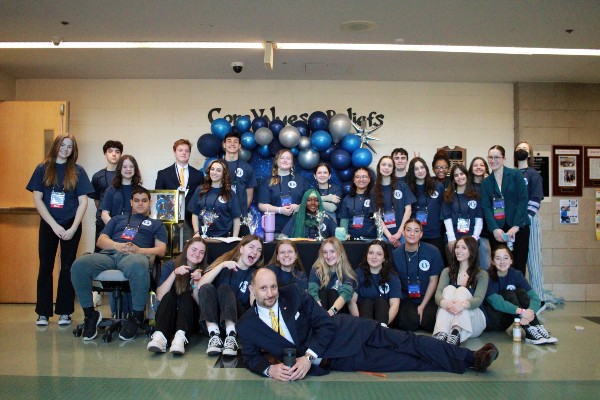“The woods are lovely, dark and deep, but I have promises to keep, and miles to go before I sleep,” wrote Frost in an extremely famous poem, “Stopping By the Woods on a Snowy Evening.”
But just as impressive and substantially less known is the line: “It is not enough these days to simply ‘question authority;’ you gotta speak with it, too,” –a not so famous saying spoken by Taylor Mali in his poem “Speak With Conviction.”
A few months ago the name Taylor Mali meant absolutely nothing to me; I was more interested in Shakespeare, cummings (put in lowercase to reflect the style of his poems), and Poe than any of the modern poets. In fact, after a brief but extremely informative poetry month in my Literature class, I was intrigued by the ins and outs of classical poetry. However, I never bothered to look into a whole different view of poetry: one that discussed modern issues while letting out the occasional swear as a poet slips into a fit of rage.
So here’s how my transition from classic to modern happened: one day I logged onto my Facebook to see a post by one of my close friends and fellow AP Lit students. With just a click, I was introduced to a whole new world of poetry. This world is certainly not taught in class; however, as I dove deeper I found poetry that discussed modern issues such as racism, war, and the struggles of a teacher to make a difference.
I entered the world of Def Poetry, a show on HBO. Def Poetry was produced by hip-hop music entrepreneur, Russell Simmons, in 2002. This show, featured on HBO, presents famous and up-an-coming poets and gives them an opportunity to share their work in a non-competitive atmosphere.
Although this show is not meant to be slam poetry, the same kind of work is used on this show that is commonly used in poetry slams. A poetry slam is a competition where poets deliver original work and then a winner is selected by judges that are members of the audience.
The show’s modern atmosphere and powerful messages led to its opening on Broadway in November 2002. In 2003, it won a Tony Award for Best Special Theatrical Event.
Although the series is now over, videos on Youtube.com got me hooked on Def Poetry. My favorite has to be Beau Sia. Sia, an Asian American, debuted in Season 1, Episode 3 with his poem “Give Me a Chance.” In this poem, Sia expresses the difficulty of making it in the world of the arts while addressing day-to-day stereotypes of Asian men. This is especially shown when he says, “If you need a Chinese Jay-Z, a Japanese Eminem, a Vietnamese ’Nsync, please consider me because I am all these things and more… I will broken English my way to sidekick status.”
From this first presentation, I knew that he is extremely comfortable with himself and embraces these stereotypes. For this reason, I was hooked on Sia. Based on the title of his next poem, “Asian Invasion,” I knew this was going to spark a few racially-based debates. This was pretty much confirmed in one of his opening lines: “We are not just on the big screen in the kung foo flicks you adore; we are everywhere; we are programming your websites, making your executives look smart, and getting into your schools for free.” Although I am not Asian, and cannot relate to his need for an American melting pot that includes Asians, I can relate to his need to fit in and be accepted; I kept listening.
His next appearance was his performance of “Love,” which is by far my favorite Def Poetry performance to date. When he opened his poem with, “I think love is the most beautiful thing in the world,” I was surprised. Where did the modern and risky poetry slam superstar that I knew and loved go? When he continued onto his next line, “and I don’t [care], I have no original ideas, I recite poetry to get women to fall in love with me…” I knew I found him again.
However, just like most other Def Poetry poems, this poem has a meaning that tends to sneaks up on you in the end. He starts about talking about Halloween, the ghosts of his girlfriends past, the sweaters he wears when he tries to be sensitive, and a rumor about the average Asian man (I think you know what I’m saying). He ends with a line that hit me like no other poet has been able to do: “Someone, love me.”
“I’m so deep pointing to my brain magnifies the value of what I say 327 fold.”
“I’m so deep my shadow has a PhD in deepness.”
“I’m so deep, the end of the poem is really the beginning.”
These are three of my favorite quotes from Sia’s performance of “I’m So Deep.” To this day, I am still trying to figure out what this poem is really supposed to be about. Maybe it is a satirical write-off of poets who think they are “so deep”; maybe it is a representation of what could potentially make a person deep; maybe it is Sia being cocky? Or maybe the point is to keep you wondering? You’re interpretation is as good as mine.
In his next poem “Hip-Hop,” Sia more seriously addresses the issue of racial slurs. When he discusses the common use of the term, “chink” for an Asian person he asks, “Did someone else also turn your racial slurs into compliments on your behalf?” This gives listeners an insight on slurs that may seem typical but can actually hurt the feelings of an entire race.
In his last appearance on the show, Sia performed “Back to the Now.” In this poem, Sia does not address racism or its effects but instead addresses the fact that people tend to take passive roles in determining their own futures. Rather than fighting for that we believe in, Sia expresses, we expect things to happen and change around us without effort on our part. At the end, Sia explains that people should trust because, “choice is not fun, and let us take care of it because everything is going according to plan.” What this “plan” is and who the “us” is who is taking care of everything as we let our lives slip by is up to the listener to decide.
Clearly, I am obsessed with Beau Sia. However, this does not stop me from branching out and experiencing other poets. Some of the most meaningful poems I have listened to are by other experienced poets. When Shihan, a Def Jam poet, explains that he uses his, “real eyes to realize the real lies being spoken,” I get chills. When Taylor Mali, a Def Jam poet, explains that “if [he] ever changes the world, it will be one eighth grader at a time,” I feel empowered by my decision to become an educator.
So I guess now the only choice you have to make is: Do you “Wanna Hear a Poem”?


















